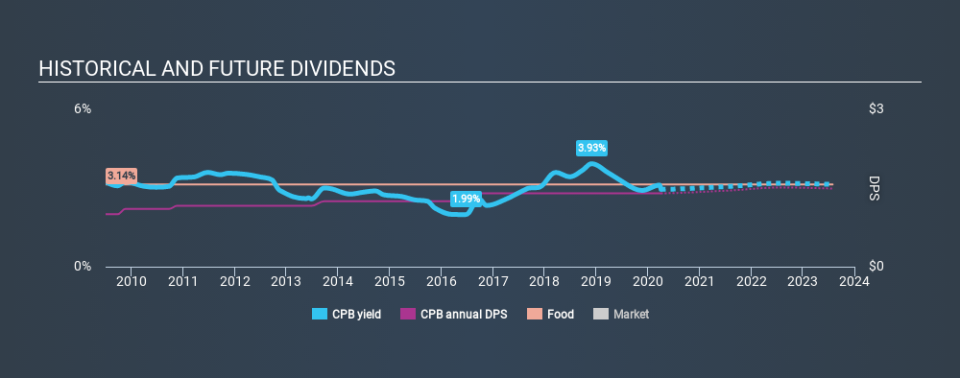Why You Should Leave Campbell Soup Company's (NYSE:CPB) Upcoming Dividend On The Shelf

Campbell Soup Company (NYSE:CPB) stock is about to trade ex-dividend in 4 days time. If you purchase the stock on or after the 8th of April, you won't be eligible to receive this dividend, when it is paid on the 27th of April.
Campbell Soup's next dividend payment will be US$0.35 per share. Last year, in total, the company distributed US$1.40 to shareholders. Based on the last year's worth of payments, Campbell Soup has a trailing yield of 2.9% on the current stock price of $47.45. We love seeing companies pay a dividend, but it's also important to be sure that laying the golden eggs isn't going to kill our golden goose! As a result, readers should always check whether Campbell Soup has been able to grow its dividends, or if the dividend might be cut.
Check out our latest analysis for Campbell Soup
If a company pays out more in dividends than it earned, then the dividend might become unsustainable - hardly an ideal situation. Last year, Campbell Soup paid out 92% of its income as dividends, which is above a level that we're comfortable with, especially if the company needs to reinvest in its business. Yet cash flows are even more important than profits for assessing a dividend, so we need to see if the company generated enough cash to pay its distribution. Fortunately, it paid out only 42% of its free cash flow in the past year.
It's good to see that while Campbell Soup's dividends were not well covered by profits, at least they are affordable from a cash perspective. Still, if this were to happen repeatedly, we'd be concerned about whether the dividend is sustainable in a downturn.
Click here to see the company's payout ratio, plus analyst estimates of its future dividends.
Have Earnings And Dividends Been Growing?
Businesses with shrinking earnings are tricky from a dividend perspective. If earnings fall far enough, the company could be forced to cut its dividend. With that in mind, we're discomforted by Campbell Soup's 9.5% per annum decline in earnings in the past five years. When earnings per share fall, the maximum amount of dividends that can be paid also falls.
Many investors will assess a company's dividend performance by evaluating how much the dividend payments have changed over time. Since the start of our data, ten years ago, Campbell Soup has lifted its dividend by approximately 3.4% a year on average. The only way to pay higher dividends when earnings are shrinking is either to pay out a larger percentage of profits, spend cash from the balance sheet, or borrow the money. Campbell Soup is already paying out 92% of its profits, and with shrinking earnings we think it's unlikely that this dividend will grow quickly in the future.
Final Takeaway
Is Campbell Soup worth buying for its dividend? It's not a great combination to see a company with earnings in decline and paying out 92% of its profits, which could imply the dividend may be at risk of being cut in the future. However, the cash payout ratio was much lower - good news from a dividend perspective - which makes us wonder why there is such a mis-match between income and cashflow. Overall it doesn't look like the most suitable dividend stock for a long-term buy and hold investor.
With that in mind though, if the poor dividend characteristics of Campbell Soup don't faze you, it's worth being mindful of the risks involved with this business. To help with this, we've discovered 4 warning signs for Campbell Soup (2 make us uncomfortable!) that you ought to be aware of before buying the shares.
We wouldn't recommend just buying the first dividend stock you see, though. Here's a list of interesting dividend stocks with a greater than 2% yield and an upcoming dividend.
If you spot an error that warrants correction, please contact the editor at editorial-team@simplywallst.com. This article by Simply Wall St is general in nature. It does not constitute a recommendation to buy or sell any stock, and does not take account of your objectives, or your financial situation. Simply Wall St has no position in the stocks mentioned.
We aim to bring you long-term focused research analysis driven by fundamental data. Note that our analysis may not factor in the latest price-sensitive company announcements or qualitative material. Thank you for reading.

